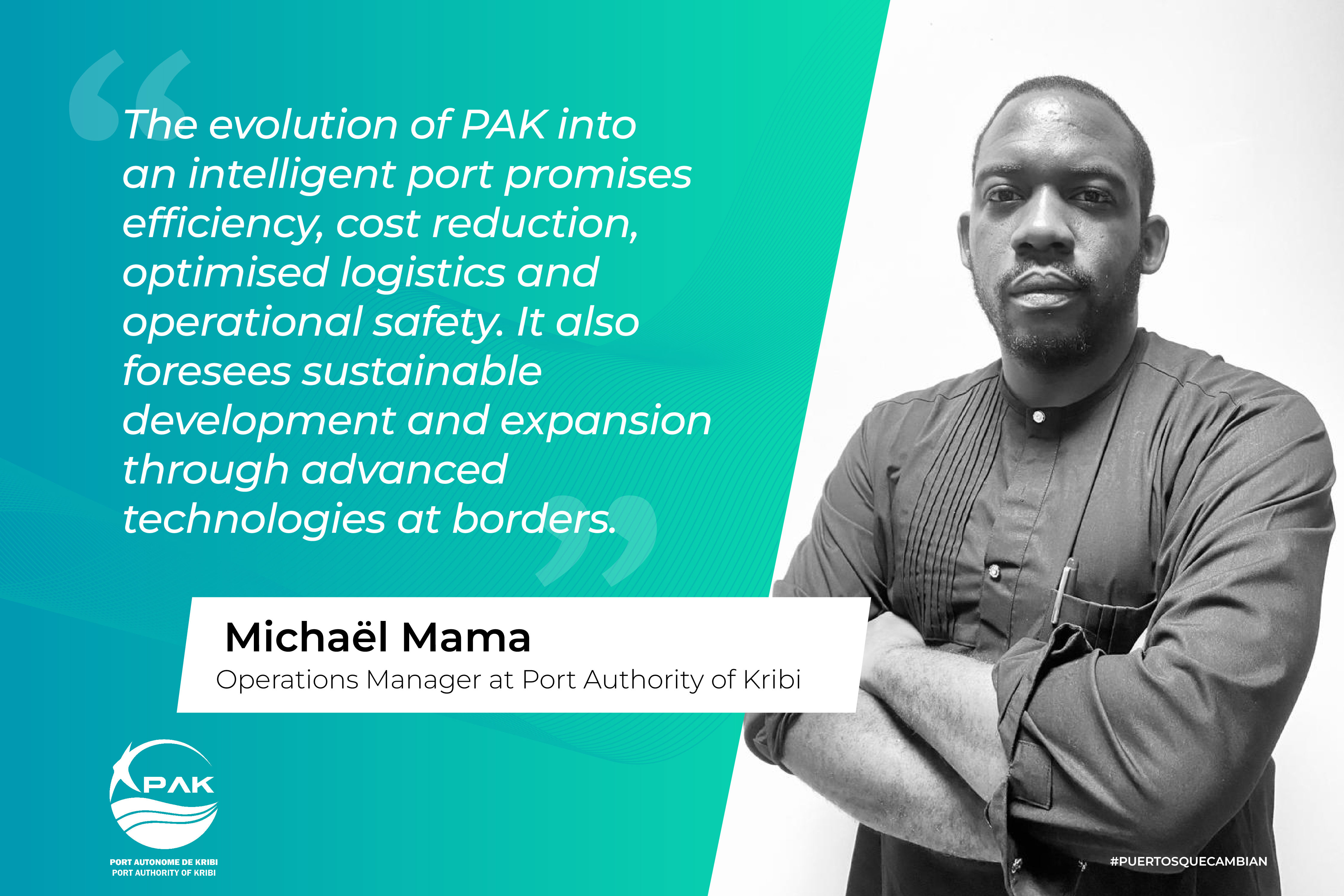Interviewing Michaël Mama from the Autonomous Port of Kribi
The Autonomous Port of Kribi (PAK) manages Kribi Port with cutting-edge facilities, accommodating large vessels in West and Central Africa. Its modern resources ensure efficient operations, with private operators maintaining service excellence. PAK, adhering to national regulations, guarantees top-tier service for ships and cargo. It’s set to be crucial for Cameroon’s economy, generating around 5,000 jobs and fostering economic growth and improved living standards through infrastructure development and enhanced social services.
Michaël Mama, Opeations Manager at Port Authority of Kribi
Michaël Mama 38 years old, Operations Manager of the Port Authority of Kribi (PAK) in Cameroon. A manager in transportation, logistics, and international trade, he began his career in air freight forwarding at Panalpina before developing his expertise in maritime transportation organization and international freight trading successively with the Toll Group and Militzer & Munch. Twelve years ago, he turned towards his native continent by joining Africa Express Line, the integrated maritime company of the Compagnie Fruitière group specializing in transporting from Africa to Europe. He returned to work in Cameroon in 2014, where he joined the project teams for the construction and development of the Kribi Deep Sea Port before joining the PAK in 2017.
- In a totally globalized economy, digital transformation is a must for any organization, could you briefly describe how you see the current situation of the port sector in Africa?
In my opinion, the situation varies from one country to another and from one port to another. Overall, African ports are increasingly aware of the importance of digital transformation to improve their operational efficiency, competitiveness and contribution to the regional economy. Significant investments are being made in upgrading infrastructure to integrate digital technologies; in the adoption of digital solutions to improve flow management; and training and capacity building in the fields of technology and information.
- From your point of view, what are the main challenges African ports are facing?
African ports face particular challenges. First, the lack of telecommunication infrastructure and limited internet connectivity in some countries hinder the adoption, integration and reliability of digital solutions in the management of port operations. Secondly, political uncertainty, complex regulation of the digital sector, budgetary constraints and the difficulty of raising funds do not allow for effective and adequate investment strategies in the long term. Finally, concerns about data protection and cybersecurity, which require not only significant reforms but also appropriate training to ensure the sustainability and transparency of port operations.
- One of the main goals of the Port Authority of Kribi is to become a Smart Port or deploy a Smart Port platform, which are the steps you are following in order to achieve it?
Indeed, we wish to develop a modern and efficient Information System, providing innovative value-added services, in alignment with the company’s vision of development in a context where, although new, it is necessary to make a place for itself in a highly competitive environment.
In this context, we first defined our IS architecture before framing our actions with the various stakeholders in the sector through cooperation agreements. Subsequently, we built our telecommunications infrastructure and networks, and we built the fibre optic network between the various strategic sites and our entire port area. We have put in place the necessary technologies and tools: perimeter surveillance, access, control and maritime security; to help navigate and monitor the flow of goods. And finally, at the same time, we have developed a functional integrated management software package for the company while building our port information system and our geographic information system around the axes mentioned above. From now on, beyond the optimization of the IT infrastructure layer, it will be necessary to improve the network infrastructure and telecommunication layer through the implementation of a VTMIS and an IP and communication network.
- Which are the greatest benefits you hope to achieve once PAK becomes a Smart Port?
We want to improve our productivity, our performance and the quality of our services. This will result in:
- At the operational level by reducing waiting times, bottlenecks and better visibility and transparency of operations.
- At the level of transport and logistics organisers through better synchronisation of collection and delivery operations and optimisation of transit times.
- At the financial level, the reduction of port passage costs as well as the operating, upkeep and maintenance costs of port equipment and infrastructure.
- At the commercial level, optimising the security and safety of port goods, facilities and equipment; as well as optimizing the customer experience through real-time tracking of shipments, online booking of port services, and electronic document and payment management.
Finally, we can hope for a more sustainable development of port activities in line with environmental concerns as well as the establishment of a framework conducive to innovation in the fields of information technology.
However, our ambition is even greater, as we want to extend our influence across the corridors by developing smart border technologies.
- Looking at the future, it seems that SaaS deployment will impose over on-premise, what is your opinion about cloud systems?
Software applications delivered via the internet offer various advantages, including the optimization of telecommunication infrastructure management by reducing the fixed costs of players through pooling on the one hand and above all increased agility of solutions through remote accessibility and better data resilience. However, as mentioned earlier, the main concern remains the security and protection of stakeholders’ data, especially in an environment as sensitive as the port sector. It is therefore necessary, in my opinion, that the appropriate reforms at the African level that will promote and frame the development of cloud systems across the continent.




